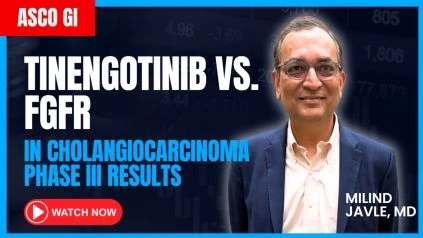OncologyTube: [00:00:00] We have Dr. Milind Javle, MD. He is from the Department of Gastrointestinal Medical Oncology at the University of Texas MD Anderson Cancer Center in Houston, Texas. Thank you for joining
Milind Javle, MD: us today. So I’m very excited to be here and discuss a phase 3 trial that has just been initiated in FGFR altered cholangiocarcinoma.
To give you a background, FGFR altered cholangiocarcinoma can be treated now with Pemigatneb. Uh, and furibatinib. These are, uh, agents that are FDA approved. Unfortunately, resistance inevitably occurs, and this occurs after six to eight months, and after that, patients do not have any standard options.
Tiningotinib is a specific inhibitor of the FGFR1 3 kinase, which has a unique mechanism of action, and it is, uh, it acts against resistant kinase mutations. So therefore, it is effective in the setting of [00:01:00] FGFR inhibitor refractory cholangiocarcinoma, as we showed in a recent interim analysis at ASCO GI 2024.
So this has led to a phase three trial, uh, which, uh, uh, we have initiated, which will be the first phase three trial in the FGFR refractory space in cholangiocarcinoma. The patients who have a cholangiocarcinoma and FGFR, uh, fusions and have received prior chemotherapy and FGFR inhibitors will be randomized to one of two arms.
One will be a chemotherapy that is physician’s choice, which is one of three regimens, versus 10. 0 in the dose of 10 milligrams or eight milligrams daily. Um, and then the study will be further expanded with an optimal dose. The primary endpoint of the study is overall survival and the study will be conducted in over 100 institutions around the world.
So we are very excited to initiate the study and look forward to enrolling patients on the same.
OncologyTube: Great. If I could just ask you, [00:02:00] um, what are the key takeaways, our audience are oncologists and hematologists. What are some of the key takeaways for the oncologist or the gastrointestinal oncologist?
Milind Javle, MD: Some of the key takeaways are FGFR alterations occur in about 10 to 15 percent of cholangiocarcinoma.
It is very important that patients be investigated and undergo genetic profiling so that we can understand these mutations and aberrations better. These patients can be targeted with inhibitors that are approved at this time. And when progression occurs, it is again feasible. that these patients can be treated on a clinical trial.

